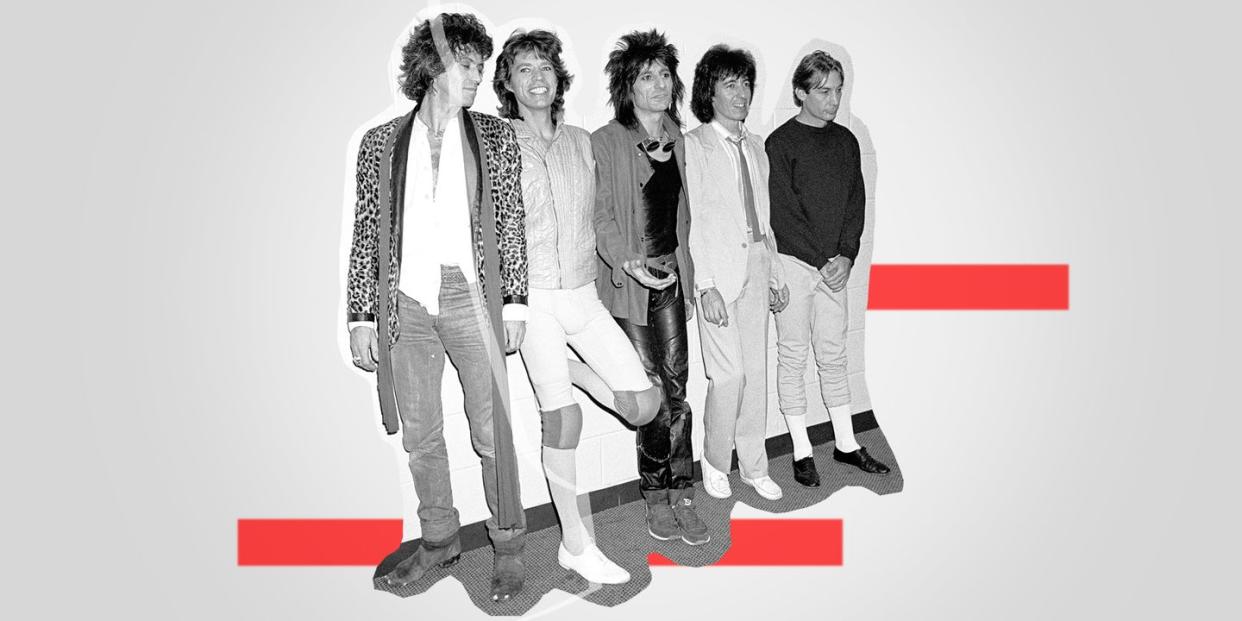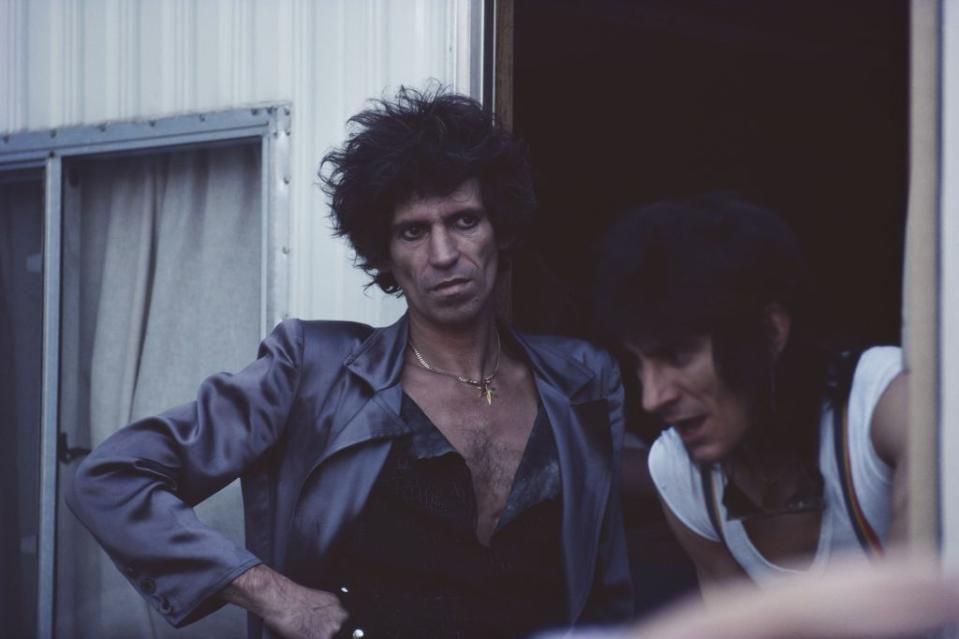The Curious Case of 'Tattoo You'

It was 1981, and the Rolling Stones were stuck. They had committed to a massive summer tour, and they didn’t want to waste the opportunity to promote a new record. But Mick Jagger and Keith Richards were fighting—barely speaking, much less writing any new songs—and the clock was ticking. “There was no time to make a whole new album and make the start of the tour,” said Richards, in 1993.
The band’s longtime engineer, Chris Kimsey, came up with an elegant solution. They had released five albums in the previous seven years, so maybe, he reasoned, there were enough worthy outtakes or unfinished drafts to assemble a record. “I spent three months going through like the last four, five albums finding stuff that had been either forgotten about or, at the time, rejected,” said Kimsey in a 1982 interview. “And then I presented it to the band and I said, ‘Hey, look, guys, you’ve got all this great stuff sitting in the can and it’s great material, do something with it.’"
The result, released forty years ago this week, was Tattoo You—ultimately, one of the most curious entries in the Rolling Stones’ discography. It was the last album by the band to hit Number One on the US charts (though, to be fair, every single one of the Stones’ 24 studio albums since their 1964 debut, England’s Newest Hit Makers has reached the Top Five). Powered by the beloved opening track “Start Me Up,” it was certified four times platinum, a figure surpassed only by 1978’s six-million-selling Some Girls. Tattoo You is generally considered the last great Rolling Stones album, but it’s hard to believe that it works as an album at all.
Consider where band relations were around this time: Following that triumphant Some Girls release—an album which stared down the simultaneous challenges of punk and disco, as well as Richards’ high-profile drug arrests, to emerge victorious—they put out 1980’s underwhelming Emotional Rescue. And as the guitarist emerged from his heroin haze, he entered a new period of conflict with Jagger.
“It was the beginning of the ‘80s when Mick started to become unbearable,” wrote Richards in his 2010 memoir Life. He describes Jagger’s sense of absolute control over the band—“I realised that Mick had got all of the strings in his hands and he didn’t want to let go of a single one”—and recounts how the singer’s go-to response at the time was “Oh, shut up, Keith.” Meantime, guitarist Ronnie Wood, just a few years into his tenure with the band, was descending so far into drugs that he was almost barred from the 1981 tour.
So Kimsey’s idea, unorthodox though it was, was certainly worth a shot. He dug up alternate takes and sketches going as far back as the sessions for 1973’s Goats Head Soup. (Famously, the basic track for “Start Me Up” was recorded on the same day they cut the 1978 Number One hit “Miss You.”) Initially referred to as “Never Stop,” the song had a reggae arrangement, but Kimsey found a version in the vault that recast it as pure rock n’ roll; this discarded iteration launched what would eventually become one of the band’s most iconic riffs.

It was up to Jagger to write lyrics, record vocals, and finish the songs (maybe that power grab wasn’t all bad). “I put them all together in an incredibly cheap fashion,” he later said. “I recorded in this place in Paris in the middle of winter. And then I recorded some of it in a broom cupboard, literally, where we did the vocals. The rest of the band were hardly involved.”
Echoes of the earlier albums are clear if you’re listening for them: the funk groove of “Slave” lines up with 1975’s jam-heavy Black and Blue, and the jittery picking on Richards’ “Little T&A” has a similar edge to some of Emotional Rescue. But Kimsey made one insightful decision that was crucial to the success of Tattoo You; his selection of material included a heavy dose of ballads, which were eventually grouped together on the album’s second side and created something entirely unique in the Stones’ body of work.
That run of songs—the magnificent “Worried About You,” “Tops,” “Heaven” (which is, oddly, the third-most-streamed cut on the album), “No Use in Crying,” and the irresistibly bittersweet closer “Waiting on a Friend,” one of three tracks on which jazz saxophone colossus Sonny Rollins added a glorious solo—still comes as a shocking surprise. The tracks have a dreamy, hazy sensation, and Jagger delivers some stunning falsetto vocals, emotive without being overly theatrical. Playing almost like a suite, this second half of Tattoo You pointed toward a brand-new, more mature direction for the Stones…which never really came to fruition.
Time for a confession: I’ve never really liked “Start Me Up.” It always felt too formulaic, like the Stones were consciously trying to write an anthem. The rest of the rock songs on Tattoo You are fine—and Charlie Watts plays his ass off, with his drums given a sparkling treatment in Bob Clearmountain’s mix. But can anyone really argue that “Hang Fire” or “Neighbours” are truly A-List Rolling Stones songs?
Still, there’s a consistency to the album that’s especially impressive given the circumstances of its assembly, maybe because they were being guided by Kimsey, a voice outside the band with more objective ears. Robert Palmer, the always-astute rock critic at the New York Times, noted the difference from the genre exercises and trend-chasing that defined much of the group’s ‘70s efforts. “None of them are Chuck Berry retreads, none of them are disco, and none of them are reggae,” he wrote, “they are all rock-and-roll, with more than a hint of the soul and blues influences that were so important in the band's early work.”
Forty years later, it’s hard to listen to Tattoo You without the baggage of its place in Rolling Stones history, its mantle as their final important recording. It was followed by the lacklustre Undercover, the sour (though underrated) Dirty Work, and then years spent apart before entering the elder statesmen role assumed when they regrouped for Steel Wheels in 1989.

In October, the band will unveil a deluxe reissue of the album, with nine unreleased tracks (last week, the first of these—“Living in the Heart of Love,” an outtake from 1974’s It’s Only Rock and Roll—came out, and an alternate take of “Start Me Up” will be included). But what can that actually mean? What are outtakes from an album of outtakes? If it’s an excuse to put out some favourite ’70s rarities, so be it, though it would be far more interesting to hear some of the raw, incomplete tracks that Kimsey dug up en route to the final album.
The Rolling Stones continue to be one of rock’s greatest experiments. Nearing the sixty-year mark, no one has ever sustained being a band for this long, and every day, they embark on a path with no blueprint. But the music on Tattoo You could have steered them toward a new musical chapter; instead, it ended up being the end of an era.
“I think it’s excellent,” Jagger said about the album, years later. “But all the things I usually like, it doesn’t have. It doesn’t have any unity of purpose or place or time.”
As for Richards, who claimed to like Tattoo You “very much,” the album doesn’t warrant a single mention from him in his autobiography. He was, at the very least, pragmatic about the unlikely genesis of this unlikely landmark. “With a band that goes on for a long time,” he said, “one way or another you end up with a backlog of really good stuff that, for one reason or another, you didn’t get the chance to finish or put out because it was the wrong tempo or too long—purely technical reasons.
“It’s stupid to leave all that great stuff just for want of finishing it off and getting it together.”
You Might Also Like


